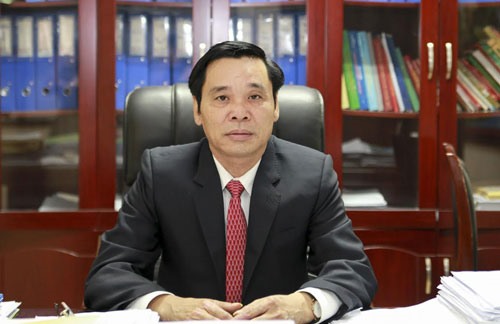 Society
Society

Chu Phú Mỹ, director of the Hà Nội Department of Agriculture and Rural Development tells the Hà Nội Mới (New Hà Nội) that the capital city possesses ideal conditions for industrialising agriculture, but they need to be used well.
 |
| Chu Phú Mỹ. — Photo hanoimoi.com.vn |
Chu Phú Mỹ, director of the Hà Nội Department of Agriculture and Rural Development tells Hà Nội Mới (New Hà Nội) that the capital city possesses ideal conditions for industrialising agriculture, but they need to be used well.
What are some of the key advantages that will help Hà Nội industrialise its agriculture sector?
Doing this is a high priority task. The city has all the factors to develop a modern agricultural industry, including mechanisms, policies, capital resources and particularly, the grey matter of experts and scientists working in universities, institutes, research centers and other institutions.
Hà Nội also has the largest agriculture land area in the country. Its soil is suitable for growing different plant and animal species. Furthermore, Hà Nội farmers are experienced and have a good approach to science and technology. These are good foundations for the city to introduce mechanisation in agriculture practices. Hà Nội also has a large consumption market with a population of more than 7.5 million whose living conditions have improved significantly, which is a very important driving force for the consumption of high-value agricultural products.
While the city has all these advantages, what are some of the challenges and how will these be dealt with?
To develop industrialised agriculture it is very important to get enterprises involved. We know that enterprises are the entities with the potential to make capital investments in technology as well as in human resources. They are also strong in market research, and application of science and technology in processing and storage. Other players are also very important, the co-operatives and collectives. They are the ones that have direct communication with the farmers.
But currently involvement fo enterprises in agricultural production is still low. Why?
In my opinion, a “major obstacle” is land. Hà Nội has a large agricultural land area, but it has been allocated to households. That’s why agricultural production is very scattered. Now if we want to have large land areas to lease to enterprises, we need huge sums of money to acquire agricultural land from households. Land prices are much higher in Hà Nội than other places. For example, in Ứng Hòa and Phú Xuyên districts, the cost is VNĐ 8.1 billion ($355,700) per hectare while in other districts, this goes to VNĐ 10 billion ($440,000) per hectare. This is a big hurdle preventing many enterprises from investing in agriculture production.
The huge capital investment involved is a major hurdle preventing enterprises from investing in advanced technology. This is why most agriculture enterprises operating in Hà Nội are small scale, even super small. Then credit for agriculture and rural development in general and farmers in particular is very limited.
How does the city plan to facilitate land aggregation?
In my opinion, the first thing we have to do is to revise the Land Law. For example, local governments in some districts have come up with an idea to hire land from households who don’t want to farm their land and then lease it to enterprises. Here, the farmers will still own their land, and the enterprises will have land to build their factories.
In addition, we should promote the role of co-operatives to set up large scale production zones – a very important condition for introducing advanced technology in agricultural production.
What are some the other measures needed?
To make industrialised agriculture a reality, several plans have to be implemented simultaneously, including expanding credit and accessing advanced technology.
Since investment capital is the biggest hurdle for both household economic development and industrialization of agriculture in Hà Nội, we hope the administration will come up with polices that motivate more enterprises to invest in technology transfer and hi-tech agriculture.
At present, some 3.5 million people live in the countryside. So we need to reorganize them into production groups. This is the only way to overcome the current fragmented state of production.
To industrialise its agriculture sector, Hà Nội should develop several models, so that enterprises, co-operatives and farming households can learn how advanced technology can be applied in agricultural production, particularly in rice transplanting, harvesting, storing and other activities. VNS




